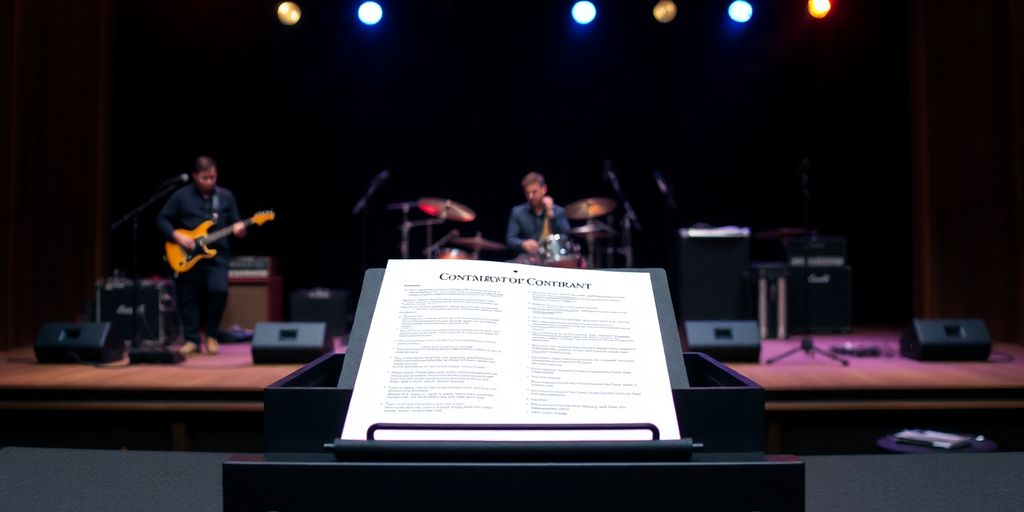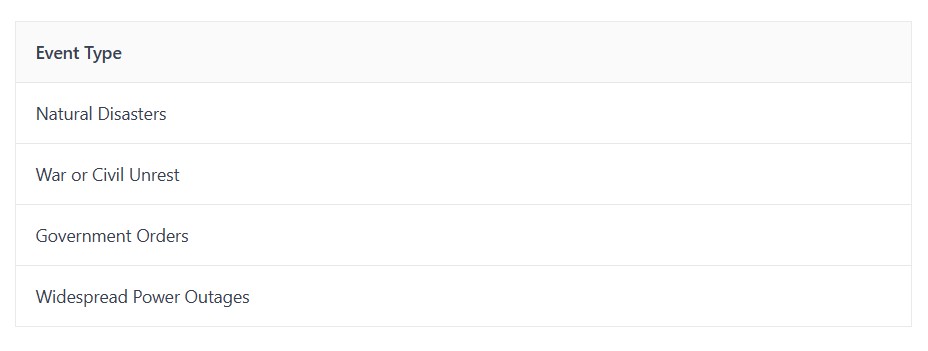Register as an organizer
Click the button below and finish your organizer registration, or fill out the form and we will be in touch to assist you.

Putting on a show, whether you're the artist or the venue, involves a lot of moving parts. It’s easy to get caught up in the excitement, but overlooking the details in contracts can lead to big headaches later on. Think of event contracts as the roadmap for your gig. They lay out exactly what everyone expects, from when the doors open to how the money gets split. Making sure these agreements are clear and fair from the start is key to a successful event.
When you're booking a gig, whether you're the artist or the venue, getting the basics down on paper is super important. It's not about distrust; it's about making sure everyone knows what's expected and avoiding those awkward "I thought you meant..." moments later on.
This is where you nail down the nitty-gritty of the actual show. Think about the date and time, obviously, but also the exact start and end times for the performance itself. What kind of show is it? Is it a full concert, a background set, or something else? Knowing the venue's address and who to contact there is also key. Don't forget to specify when the artist needs to arrive (call time) and when sound checks will happen. Getting these details clear upfront means fewer surprises on the day of the event.
Money talk. How much is the artist getting paid? Is it a flat fee, or is it tied to ticket sales? Sometimes, especially for community events, the pay might be a bit different, maybe a donation or a percentage. You also need to figure out when the payment happens. Is it all upfront, a portion before and a portion after, or entirely after the show? And how will they get paid? Check, direct deposit, cash? It's also wise to mention if taxes are included or will be added on.
Beyond the performance itself, there are other practical things to sort out. This includes things like the duration of the set, as mentioned before, but also any specific technical needs the artist might have. Are there any special instructions for the venue, like specific stage setup requirements or access needs? It's all about making the day run smoothly for everyone involved. A clear list of what's expected logistically can save a lot of headaches.
When you're putting on a show, whether you're the artist or the venue owner, you've got to think about who owns what and what everyone's allowed to do with it. It’s not just about the performance itself; it’s about what happens before, during, and after.
So, is the venue planning to record the show? This could mean video, audio, or even just snapping some photos. If they are, the contract needs to spell out that the artist is giving them permission to do so. This is often called a 'grant of rights.' It should also say what the venue can do with those recordings – like post them on their social media or website. On the flip side, the artist usually lets the venue use their name, photos, and maybe even some music to promote the gig. It's all about making sure both sides agree on how their image and work will be used. You'll want to check if these uses seem fair and reasonable from the artist's point of view. Don't forget about publishing rights, too; that's a whole other layer to consider.
Merchandise is a big deal for artists, and venues often want a piece of that action. The contract needs to be clear about who's handling the merch table. Is it the artist's crew, or is the venue taking charge? Sometimes, venues will ask for a percentage of the merchandise sales, even if they aren't the ones actually selling the items. This has become a pretty common point of discussion in the live music world, so make sure it's ironed out.
Here’s a quick look at common merch arrangements:

This ties into the 'granting rights' part, but it's worth its own mention. How can the venue use the artist's name, logo, or photos in their advertising and promotional materials? Are they allowed to use them indefinitely, or only for a specific period related to the event? The artist needs to be comfortable with how their brand is being represented. It’s a good idea to have a list of approved promotional assets that the venue can use. This helps prevent any misunderstandings down the road. You can find more details on artist agreements at Edwards Creative Law.
It’s really important to be specific here. Vague terms about using an artist’s name can lead to problems later. Think about exactly what photos are okay, what wording can be used, and where it can be published. Both parties should review and agree on these details before the contract is signed.

Things don't always go according to plan, right? That's why it's smart to think about what happens when the unexpected pops up. We're talking about stuff like bad weather, equipment failures, or even if someone just can't make it.
This is where you spell out what happens if either the artist or the venue has to back out. It’s not just about saying "sorry, can't make it." You need to define what constitutes a cancellation and what the consequences are. For instance, if the venue cancels last minute, what does the artist get? Usually, it involves the return of any deposit and maybe some extra compensation for lost time and expenses. On the flip side, if the artist cancels, the venue might be entitled to keep the deposit and potentially sue for damages if they can prove they lost money because of the cancellation. It’s a two-way street, and the contract needs to make that clear.
This is a fancy legal term for "acts of God" or things completely outside anyone's control. Think major natural disasters like hurricanes, earthquakes, or even widespread power outages that make the event impossible. A good force majeure clause basically says that if something like this happens, neither party is at fault, and obligations are suspended or canceled without penalty. It’s important to list specific examples of what qualifies, so there’s no confusion later. For example, a contract might state:

It’s really about acknowledging that some things are just bigger than any contract. The goal is to protect both parties from being unfairly punished when circumstances are truly beyond their control.
Beyond the big, dramatic stuff, there are smaller, more common issues. What if the venue's sound system isn't what was agreed upon? Or what if extreme heat makes it unsafe for the artist to perform outdoors? These are the kinds of things you need to anticipate. For outdoor events, a clause might require the client to provide a safe, shaded area or an indoor backup plan. If the artist feels conditions are unsafe, they should have the right to stop performing without penalty, and the contract should support that. Documenting these conditions with photos or videos can be really helpful if there’s a dispute later. It’s about setting expectations and having a plan for when reality doesn't quite match the vision.
When you're booking a gig, it's not just about the music itself. You've got to think about what you'll need to actually do the show and what you'll need to be comfortable while you're there. This covers everything from the gear you'll use to the snacks and drinks provided.
This is all about making sure the artist is taken care of. It can include things like providing a place to stay if the gig is out of town, or covering travel costs. A per diem is also common, which is a set amount of money given to the artist each day to cover food and other personal expenses. It's basically a daily allowance. Sometimes, the contract will specify certain food or drink items that should be available backstage – this is often part of the artist's rider, which is a list of requirements for the performance.
This section gets into the technical stuff. What equipment, known as backline, will the venue provide for the artist to use? This could be anything from drum kits to amplifiers. It's also important to clarify who is responsible for the sound system and lighting. Are they standard for the venue, or will they be tailored to the artist's specific needs? Clear communication here prevents a lot of headaches on show night. If the venue's equipment isn't up to par, or doesn't meet the artist's technical requirements, it can really impact the performance. Sometimes, artists bring their own specialized gear to guarantee a certain quality or to avoid compatibility issues.
If the performance requires travel, the contract needs to spell out who handles the arrangements and who pays for them. This could mean the venue books and pays for flights and hotels directly, or they might reimburse the artist for expenses they incur. It's good to have details like the type of accommodation (e.g., a specific star rating for hotels) and the mode of transport specified. This avoids any confusion about what's covered and what the artist is expected to arrange themselves.
Let's talk about the money side of things, because honestly, that's usually what matters most to everyone involved. When you're booking an artist or a venue, the financial agreements need to be crystal clear. You don't want any surprises down the line, especially when it comes to getting paid or paying up.
This is where you figure out exactly when and how the money changes hands. Is it a lump sum? Are there installments? Will it be a check, a wire transfer, or maybe even cash (though that's less common for bigger deals)? It's also important to consider if the payment is due before the event, on the day of, or even after. For artists, getting at least a portion upfront can be a lifesaver, especially for travel and setup costs. Venues might prefer payment closer to or after the event, but it's all about negotiation.
Deposits are pretty standard. They show that both parties are serious about the commitment. A deposit secures the date for the artist and the venue. Guarantees are a bit different; they're a minimum amount the artist is assured to receive, regardless of ticket sales. If the show does really well, the artist might get a percentage of the door on top of the guarantee. This needs to be clearly laid out ,what's the deposit amount, when is it due, and what happens to it if the gig is canceled?
A common point of contention is the refundability of deposits. If the artist cancels, the deposit is usually returned. But what if the venue has to cancel? The contract should specify if the deposit is returned, and under what conditions.
What happens if someone doesn't pay on time? This is where late fees or interest come into play. It's not about nickel and diming, it's about incentivizing timely payments and compensating the party that's waiting for their money. You'll want to agree on an interest rate, often a percentage per month, and when it starts accruing. This clause protects both the artist and the venue from cash flow issues caused by delayed payments

When you're putting on a show, whether you're the artist or the venue, things can go sideways. Someone could get hurt, equipment might get damaged, or maybe a freak storm rolls in. That's where talking about liability and insurance comes in. It’s not the most exciting part of planning, but it’s super important to figure out who’s responsible if something unexpected happens.
So, what happens if someone trips over a cable during the performance, or if a speaker falls and breaks a window? These are the kinds of things that fall under liability. You need to be clear in your contract about who covers the costs if someone gets injured or if property gets damaged. It’s generally a good idea for both the artist and the venue to have their own insurance. Sometimes, a venue might require artists to have a certain amount of coverage, like $1 million per incident. This protects everyone involved from unexpected costs. It’s also wise to think about what happens if your gear gets damaged, is the client responsible, or is that on you?
An indemnity clause is basically a promise from one party to protect the other party from financial loss. For example, an artist might agree to indemnify the venue against any claims arising from the artist's performance. This means if someone sues the venue because of something the artist did (or didn't do), the artist would be responsible for defending the venue and covering any costs. It’s like a promise to have each other’s back financially in specific situations. You might see clauses that say one party will "defend and hold harmless" the other. It’s a way to assign responsibility before any problems pop up.
This is where you get specific about the paperwork. Your contract should clearly state what kind of insurance is needed and how much coverage is required. For instance, general liability insurance is pretty standard. You might see requirements like:
It’s also worth considering clauses that address weather. If you’re performing outdoors, you might want to state that the performance could be affected by weather and that there are no refunds if it’s rained out. Some contracts might also require the client to provide a backup indoor location or shade. Documenting conditions, like taking photos of extreme heat or wind, can be helpful if a dispute arises about whether it was safe to perform. Remember, protecting your health and your equipment is important, and your contract can help clarify responsibilities in these situations. You can find more information on event insurance to help protect yourself and your business.
So, we've gone over a lot of the nitty-gritty details that go into booking a show, whether you're the artist or the venue. It really comes down to making sure everyone knows what's expected, from when the sound check happens to how the merch money is split. Things like cancellation policies and who's responsible if something goes wrong are super important to get down on paper. It might seem like a lot, but having a clear contract just makes the whole process smoother for everyone involved. It helps avoid those awkward
Think about the little things like where the concert is, when the artist needs to be there for sound checks, and how long the performance will be. Making sure everyone agrees on these details beforehand stops confusion later.
This covers how much the artist gets paid. It could be a set amount, a share of ticket sales, or even a free show (though artists usually prefer to get paid!). It's also important to know when and how you'll get your money, like if there's a deposit or if you get paid after the show.
Contracts should explain what happens if the show gets canceled. This includes reasons like bad weather, sickness, or if one side doesn't follow the agreement. It's good to know if you can cancel without penalty and under what conditions.
This part is about who is responsible if someone gets hurt or if something gets damaged during the event. It also talks about insurance to make sure there's coverage if something unexpected happens, like an accident.
Venues might want a cut of the money made from selling artist t-shirts or other items. The contract should say if the artist or the venue will handle the sales and what percentage, if any, the venue will receive.
This section deals with things like food, drinks, and special equipment the artist needs for their performance, often called a 'rider.' It also covers travel and hotel arrangements if the artist is coming from out of town.
More blogs
Click the button below and finish your organizer registration, or fill out the form and we will be in touch to assist you.